Qld crime: How Labor presided over explosion in offences
Queensland’s juvenile criminals are murdering more people, stealing more cars, and robbing more homes since Labor came to power. SEE THE STATS
QLD Politics
Don't miss out on the headlines from QLD Politics. Followed categories will be added to My News.
Queensland’s juvenile criminals are murdering more people, stealing more cars, and robbing more homes since Labor came to power and began softening youth crime laws, with police data showing offences have soared.
It can also be revealed that despite a highly spruiked 10-point plan released after the horrific stabbing death of Moreton Bay mother Emma Lovell – allegedly at the hands of young criminals – the number of hardcore youth offenders has climbed from 465 in December 2022 to 482 now.
An analysis of police data since 2015 – the same year Labor pledged to repeal a number of laws – shows offences across a range of crimes committed by juveniles has skyrocketed.
Stolen car offences committed by young people have spiralled from less than 2000 in 2015 to well over 7000 in 2023, while unlawful entry offences have more than doubled from 4895 to 10,382.
Robberies are also up, with stats showing there were 417 offences committed by young criminals in 2015 – climbing to 1437 last year.
The number of homicides committed by juveniles rose to eight last year, after five in 2022, four in 2021, six in 2020, five in 2019, one in 2018, five in 2017, none in 2016 and 2015.
Even taking into account an increase in rates due to 17-year-olds being included in the youth justice system from early-2018, unlawful entries (up 4223 from 2019), stolen cars (up 4093), robberies (up 347) and assaults (up 1276) have all increased.
The Department of Youth Justice pointed to the number of young people with a proven offence falling significantly – down by more than 30 per cent in the 10 years.
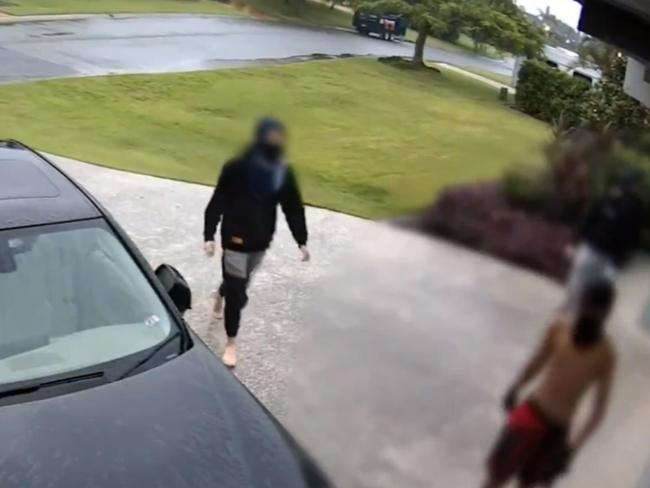
“However, we know a small cohort of hardcore offenders has been causing concern and harm in the community,” a spokesman said.
“In 2022-23, 20 per cent of distinct young people with a proven offence committed 55 per cent of proven offences by young people.”
The spokesman pointed to the new laws which were aimed at targeting the serious repeat offenders, saying there were now “more in detention” and they were starting to have an impact.
More than 2200 child defendants have been charged with the government’s new breach of bail offence since it was announced last year, and more than 1500 charges had been lodged containing one of the new “unlawful use of a motor vehicle – circumstances of aggravation” laws designed to boost penalties.
“We are also expanding our intensive case management program for high-risk repeat young offenders,” he said.
“An extra $30m for the program over four years means intensive case management will operate in 16 locations across the state.”
A timeline of changes enacted by the Labor government since it rose to power in 2015 highlights a series of youth justice strategies – at the same time as crime began to rise.
In late 2015, Labor pledged to repeal “ineffective, misguided and counter-productive” laws to reinstate the principle of detention as a last resort and remove the provisions allowing young offenders to be identified.
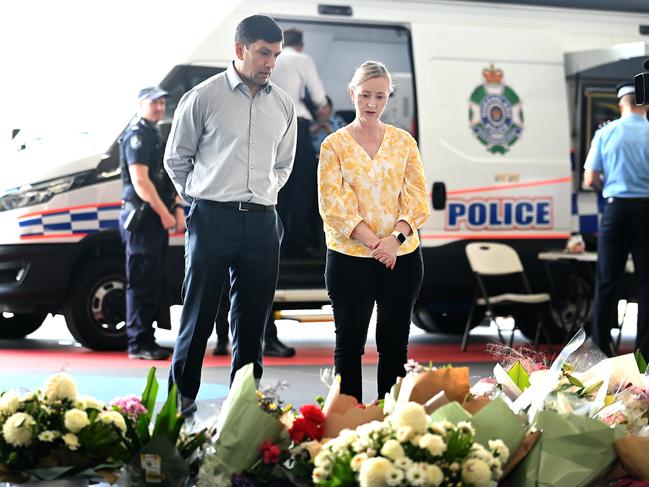
The following year changes included plans to close to the public youth justice matters in the lower court, reinstate court powers to refer an offence to a youth justice conference and end the automatic transfer of 17-year olds to adult correctional facilities.
By the time of the 2017 budget, $200m was allocated to transition 17-year-olds from the adult system to the youth justice system.
Shortly afterwards – ahead of the November election – Attorney-General Yvette D’Ath slammed the LNP’s policies including “breach of bail offence for instance”, saying that “didn’t even work the first time”.
In 2019 a new Youth Justice Strategy was released with four pillars – intervene early; keep children out of court; keep children out of custody and reduce reoffending.
In March 2020 then-premier Annastacia Palaszczuk announced a new five point plan “to crack down on youth crime”, and in 2021 Queensland Police received a $2.86bn budget boost which Police Minister Mark Ryan said, in part, would attempt “to turn youth crime statistics around”.
In November 2022, the government claimed its youth crime crackdown was working with “more serious repeat offenders in detention and for longer ”. A few weeks later, Ms Lovell would be killed.
Ms Palaszczuk last February bowed to pressure and revealed the government would reintroduce breach of bail as an offence after scrapping it in 2015.
Last weekend’s tragic murder of Ipswich grandmother Vyleen White, allegedly at the hands of a 16-year-old offender out on bail, comes close to a year since the youth crime crisis threatened to engulf the government, following the death of Ms Lovell.
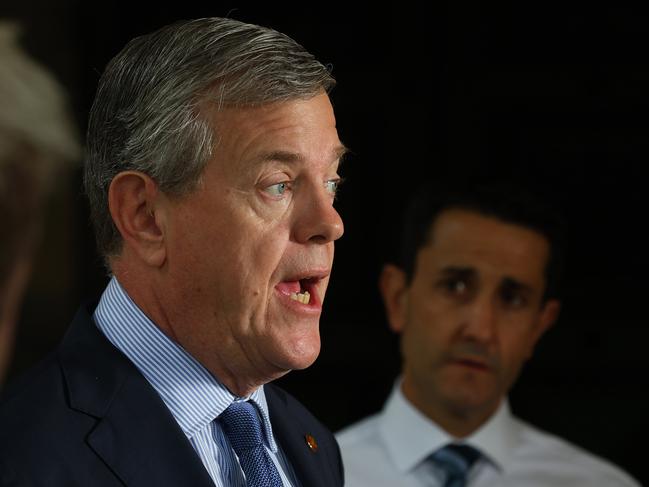
Since then Labor has made dozens of funding announcements including new detention centres, early intervention programs, enhanced high-visibility police patrols and a new Youth Justice Minister, Di Farmer, in charge.
But Premier Steven Miles was been mocked by critics for criticising magistrates who kept Children’s Courts closed without reason this week, despite voting for Labor’s 2016 Bill to close them under the guise of being fairer to the offender and victim.
Opposition justice spokesman Tim Nicholls seized on the Premier’s comments, calling out the actions of both Mr Miles and Ms D’Ath.
“I think it’s important that we’re really clear about this,” he said.
“It was Labor who took the steps systematically to start weakening the youth crime laws in Queensland from 2016.
“In April 2016, the Attorney-General (Ms D’Ath), who is still the attorney-general, who is still failing Queenslanders, crowed about the legislative reforms.
“She said this will make the community safer.
“Well, here is the question: Is the community safer today than it was nine years ago?
“And the answer that I get? And the answer that we’re all hearing is, quite demonstrably, “no”.
Mr Ryan said magistrates had the power to keep the community safe, but he disputed that they made decisions based on “political ideology”. “We’ve given (magistrates) the strong laws, the confidence around police resourcing,” he said.
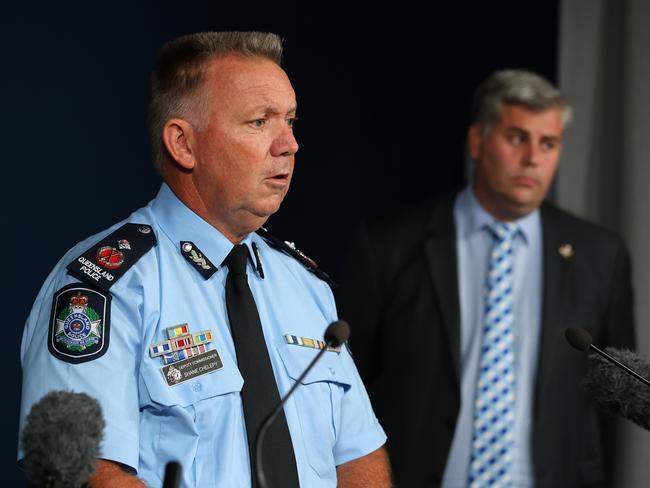
“But I encourage those (magistrates) that aren’t (remanding serious recidivist offenders) to reflect on the community sentiment and use the tools in their toolbox which are strong and measured and reflect the expectations that the community should be protected.
Police Deputy Commissioner Shane Chelepy said he was frustrated to see serious young alleged criminals released on bail.
“We do get frustrated when we see serious repeat offenders committing more offences,” Mr Chelepy said, speaking generally.
“But like I said, it’s complex … I think we’re doing a good job, I think the troops work hard every day.”
Asked whether police would support the removal of detention as a last resort, Mr Chelepy did not take a side.
“Even if the law changes, we’re still going to see young offenders get bail and we are still going to have strategies in place to keep the community safe,” he said.
“If the law changes, we will adjust.”
Mr Nicholls said “the community is not safe”. “Isn’t it any wonder that Queenslanders are losing confidence in the system when we have a government that, after nine years, seems to have thrown in the towel,” he said.
“This is a government that is not ensuring consequences for action.
“This is a government that is failing Queenslanders in their homes, in their businesses, as they go about their daily lives, even as they go to the shopping centre.
“It’s a failed government with a failed Attorney-General and with a Premier that has no answers.”
TIMELINE OF A TRAVESTY
July 2015: Government reinstates the Murri Court and Special Circumstances Court Diversion program, allocating $32.3m over four years on court diversionary processes.
August 2015: LNP-commissioned boot camps are scrapped, with Attorney-General Yvette D’Ath blaming the $16.7m cost and a KPMG report which found it failed to cut repeat offending.
December 2015: Labor abolishes breach of bail as an offence, reinstates the principle of detention as a last resort, and removes the provisions allowing young offenders to be identified. Childhood offences where no conviction is recorded now cannot be taken into account when sentencing for an adult offence.
April 2016: Youth justice matters are closed to the public in the lower courts, and the government reinstates court powers to refer an offence to a youth justice conference instead of court. It also ends the automatic transfer of 17-year-olds to adult corrections.
September 2016: A five-point plan to reduce youth crime is released and includes; targeted policing, community driven response, addressing causes of offending, boosting jobs and training and improving service collaboration.
June 2017: Seventeen-year-olds are no longer treated as adults as the state budget allocates $200m to transition them from the adult justice system into the youth justice system.
August 2017: Political battle over youth crime heats up heading into the November election as Ms D’Ath slams the LNP for policies, “breach of bail offence for instance”, that “didn’t even work the first time”.
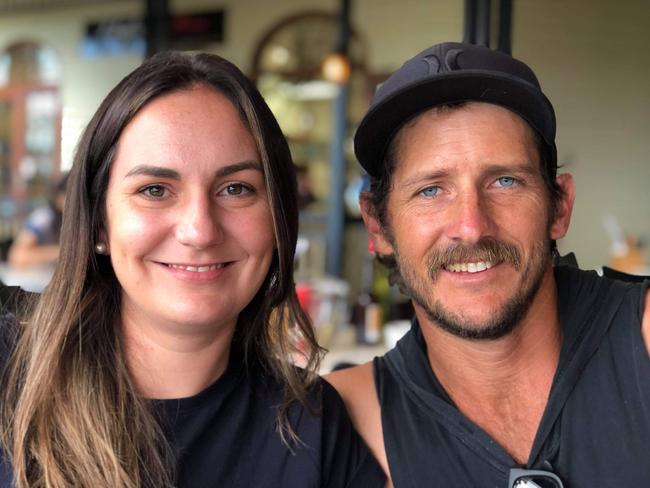
July 2018: Former police commissioner Bob Atkinson says early intervention is key “to stop young people going off the rails” and issues 77 recommendations including keeping minor offences out of the court system and reducing the number of young people in youth detention.
April 2019: Government pledges $320m youth justice package including a new 32-bed youth detention centre at Wacol
July 2019: State releases new Youth Justice Strategy with four pillars: Intervene early; keep children out of court; keep children out of custody and reduce reoffending.
August 2019: Legislation changed to enable more young people to be granted bail, so some young people can be released rather than remanded in custody. It also clarified that conditions requiring the use of an electronic tracking device cannot be imposed on a child.
March 2020: Premier announces a five-point plan “to crack down on youth crime” featuring:
Tougher action on bail; offenders posing a risk to the community should not get bail; a police blitz on bail; appealing court decisions where appropriate and a 24/7 police strike team involving youth justice workers for high-risk offenders.
June 2020: New laws passed to ensure a young person judged an unacceptable risk to the safety of the community must be refused bail.
January 2021: Matthew Field and his pregnant fiancee Kate Leadbetter are struck and killed by a drunk and high juvenile, who was on bail and driving a stolen car, on Australia Day.
February 2021: State targets “hardcore youth criminals who repeatedly offend” by requiring the fitting of GPS trackers as a condition of bail for recidivist, high-risk offenders aged 16 and 17 and a presumption against bail for offenders arrested for committing further serious indictable offences.
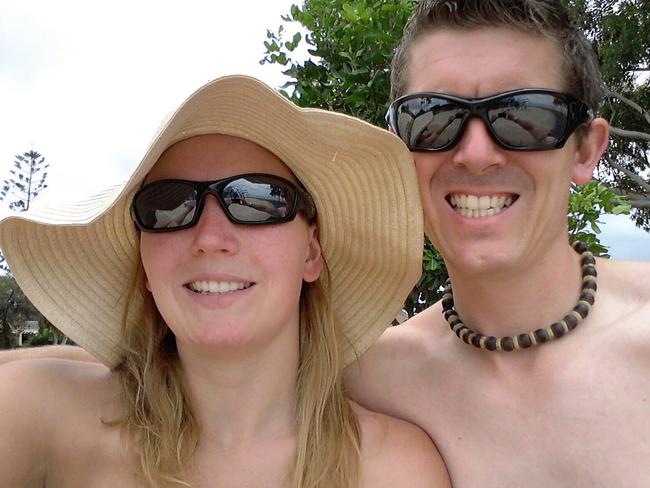
May 2021: The government announces a trial of GPS monitoring in Townsville, North Brisbane, Moreton Bay, Logan and the Gold Coast to be monitored around the clock by Corrective Services.
June 2021: Queensland Police Service gets $2.86bn budget Minister Mark Ryan says, in part, will attempt to turn youth crime statistics around.
November 2022: Government says its youth crime crackdown is working with more serious repeat offenders in detention and for longer.
December 2022: Emma Lovell is fatally stabbed at her North Lakes home, prompting a new 10-point plan, including 14 years’ jail for violent juveniles who steal cars, prompting Ms Palaszczuk to declare “government is listening and we are acting”.
February 2023: Ms Palaszczuk reveals the government will reintroduce breach of bail as an offence after scrapping it in 2015. It also implements a three-strike drug policy.
April 2023: Government trumpets a new report showing the rate of youth and adult offenders was the lowest on record. It found there were more than 20 per cent fewer unique youth offenders in 2021-22 compared with 2012-13.
September 2023: The state government will establish an Independent Advisory Group to continue to improve how feedback from Queensland’s victims of crime is received and dealt with.
October 2023: A new youth remand facility to be built at Wacol with a rapid build construction approach to deliver stage one of the facility in 2024.



